语言学pragmatics的 ppt课件
合集下载
英语语言学第八章 语用学 pragmatics ppt课件
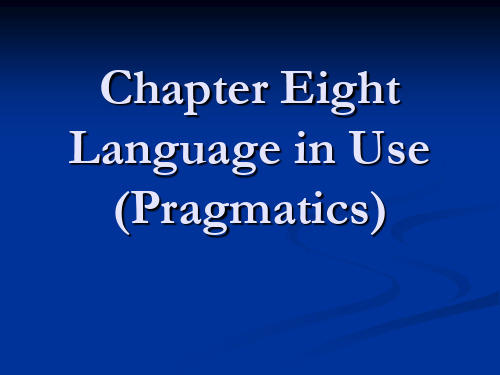
utterance, i.e. the act ostin
How to Do Things with Words (1962)
speech acts: actions performed via utterances
Constatives vs. performatives Constatives: utterances which roughly serves
Semantic meaning: the more constant, inherent side of meaning
Pragmatic meaning: the more indeterminate, the more closely related to context
2. Speech Act Theory
(ii) the relevant participants and circumstances must be appropriate.
B. The procedure must be executed correctly and completely.
C. Very often, the relevant people must have the requisite thoughts, feelings and intentions, and must follow it up with actions as specified.
Minister: addressing the groom) (Groom’s Name), do you take (Bride’s Name) for your lawful wedded wife, to live together after God’s ordinance, in the holy estate of matrimony? Will you love, honor, comfort, and cherish her from this day forward, forsaking all others, keeping only unto her for as long as you both shall live?
How to Do Things with Words (1962)
speech acts: actions performed via utterances
Constatives vs. performatives Constatives: utterances which roughly serves
Semantic meaning: the more constant, inherent side of meaning
Pragmatic meaning: the more indeterminate, the more closely related to context
2. Speech Act Theory
(ii) the relevant participants and circumstances must be appropriate.
B. The procedure must be executed correctly and completely.
C. Very often, the relevant people must have the requisite thoughts, feelings and intentions, and must follow it up with actions as specified.
Minister: addressing the groom) (Groom’s Name), do you take (Bride’s Name) for your lawful wedded wife, to live together after God’s ordinance, in the holy estate of matrimony? Will you love, honor, comfort, and cherish her from this day forward, forsaking all others, keeping only unto her for as long as you both shall live?
Chapter 6 Pragmatics.ppt

• “Today is Sunday”, semantically, it means that today is the first day of the week; pragmatically, you can mean a lot by saying this, all depending on the context and the intention of the speaker, say, making a suggestion or giving an invitation…
• Note: Sometimes they are easy to get confused, e.g.“It is raining outside” can be a constative, and also a performative, for by uttering such a sentence, we may not only state a fact, but involve in the act of informing someone about the rain.
Some Examples of Performatives
• “I do” • “I name this ship Elizabeth.” • “I give and bequeath my watch to my brother.” • “I bet you sixpence it will rain tomorrow.” • “I declare the meeting open.”
• The locutionary act----an act of saying something, i.e. an act of making a meaningful utterance (literal meaning of an utterance);
• Note: Sometimes they are easy to get confused, e.g.“It is raining outside” can be a constative, and also a performative, for by uttering such a sentence, we may not only state a fact, but involve in the act of informing someone about the rain.
Some Examples of Performatives
• “I do” • “I name this ship Elizabeth.” • “I give and bequeath my watch to my brother.” • “I bet you sixpence it will rain tomorrow.” • “I declare the meeting open.”
• The locutionary act----an act of saying something, i.e. an act of making a meaningful utterance (literal meaning of an utterance);
大三语言学基础Week-VII:Pragmatics-(A-General-View)课件

said. (ibid) Pragmatics is the study of relative distance. (ibid) Pragmatics is the study of the relationships between linguistic
forms and the users of those forms. (ibid: 4) Pragmatics is the study of those relations between language and
1.1 Wastebasket of Pragmatics
When Chomsky threw his “green ideas” “furiously” into the wastebasket of semantics, others who claim themselves to be syntactic analysts or semanticists continue doing so, each contributing new rules and assertions to the study of language and leaving behind plenty of waste for latecomers to deal with.
After that, the study of pragmatics began to take shape. However, for a long time, pragmatics “can hardly be considered an autonomous field of study” (Bussmann, 2000: 374): It was once subsumed under the term “sociolinguistics”. In 1970s, pragmatics became almost exclusively identified with Speech Act theory suggested by Austin A bit later: with conversation analysis. And, the distinction between pragmatics and semantics has never been clear-cut. Recently, some scholars even suggested the substitute of “situational semantics” (Gawron & Peters, 1990), or “illocutionary logic” (Vanderveken, 1990) for pragmatics.
forms and the users of those forms. (ibid: 4) Pragmatics is the study of those relations between language and
1.1 Wastebasket of Pragmatics
When Chomsky threw his “green ideas” “furiously” into the wastebasket of semantics, others who claim themselves to be syntactic analysts or semanticists continue doing so, each contributing new rules and assertions to the study of language and leaving behind plenty of waste for latecomers to deal with.
After that, the study of pragmatics began to take shape. However, for a long time, pragmatics “can hardly be considered an autonomous field of study” (Bussmann, 2000: 374): It was once subsumed under the term “sociolinguistics”. In 1970s, pragmatics became almost exclusively identified with Speech Act theory suggested by Austin A bit later: with conversation analysis. And, the distinction between pragmatics and semantics has never been clear-cut. Recently, some scholars even suggested the substitute of “situational semantics” (Gawron & Peters, 1990), or “illocutionary logic” (Vanderveken, 1990) for pragmatics.
Chapter 8 Pragmatics 语用学 语言学教程 胡壮麟.ppt
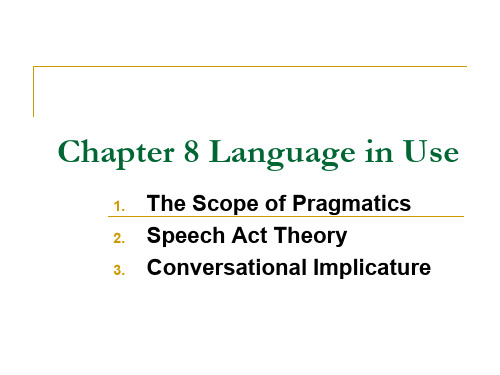
(b) In a language class where a student made a mistake, for he intended to say “tidy”.
(c) The room was wanted for a meeting.
பைடு நூலகம்
(2) I can’t work under untidy circumstances.
are acts.
8.1.1 Performatives and constatives Austin (How to Do Things with Words,
1962) Consider these sentences: a) I name this ship Elizabeth. b) I bequeath my watch to my brother. c) I now pronounce you man and wife. d) I bet you sixpence it will rain
A. (i) There must be a relevant conventional procedure, and
(ii) the relevant participants and circumstances must be appropriate.
B. The procedure must be executed (i) correctly and (ii) completely.
Possible contexts:
(a) A request to someone to tidy up the circumstances.
(b) It was an excuse for not wanting to do something there.
(c) The room was wanted for a meeting.
பைடு நூலகம்
(2) I can’t work under untidy circumstances.
are acts.
8.1.1 Performatives and constatives Austin (How to Do Things with Words,
1962) Consider these sentences: a) I name this ship Elizabeth. b) I bequeath my watch to my brother. c) I now pronounce you man and wife. d) I bet you sixpence it will rain
A. (i) There must be a relevant conventional procedure, and
(ii) the relevant participants and circumstances must be appropriate.
B. The procedure must be executed (i) correctly and (ii) completely.
Possible contexts:
(a) A request to someone to tidy up the circumstances.
(b) It was an excuse for not wanting to do something there.
《英语语言学导论》(第四版)课件Chapter 7 Pragmatics

1) the relationships between linguistic forms; 2) the relationships between linguistic forms and entities in the
world; 3) the relationships between linguistic forms and the users of
Contents
1 Introduction to Pragmatics 2 Deixis and Reference
3 Speech Acts 4 Pragmatic Presupposition
5 The Cooperative Principle and Implicature
6
Apply PP to teaching in future Politeness
7.2.6 Social deixis
the encoding of social distinctions, or the use of deictic expressions to indicate social status of the interlocutors
● honorifics e.g. tu/vous (in French) du/sie (in German) nǐ/nín (in Chinese)
--- the addressees being audio-visually present during the utterances to be able to understand these expressions
e.g. I like that one, not this one.
7.2 Deixis and reference
world; 3) the relationships between linguistic forms and the users of
Contents
1 Introduction to Pragmatics 2 Deixis and Reference
3 Speech Acts 4 Pragmatic Presupposition
5 The Cooperative Principle and Implicature
6
Apply PP to teaching in future Politeness
7.2.6 Social deixis
the encoding of social distinctions, or the use of deictic expressions to indicate social status of the interlocutors
● honorifics e.g. tu/vous (in French) du/sie (in German) nǐ/nín (in Chinese)
--- the addressees being audio-visually present during the utterances to be able to understand these expressions
e.g. I like that one, not this one.
7.2 Deixis and reference
pragmatics ppt

2.对语言使用间接性的解释
• SA 理论认为语言使用的间接性来源于话语的词汇) 语义 结构, 例如:Can you pass me the salt? 这句话从表面 看是询问对方是否有能力把盐递过来, 但实际的言外之力 却是请求对方做这件事, 询问是次要的言外行为, 请求才 是主要的言外行为。它把话语当作第一位的,把语境、使 用者以及交际效果当作第二位的。
PA 是一种宏观的人类交际行为理论, 以行为对交际产生的 实际效果为中心, 把言语交际看作社团成员之间的社会) 文 化行为, 突出语境特别是社会、文化语境的重要作用, 认为 在“制度化了的社会活动中”, 情景(如教学、看病、茶会) 在某种程度上已经预先规定了言语的使用, 即依照情景,交 际者彼此期待对方使用某些话语, 这些话语将被认为是可 以接受的。 在情景中实施的SA 就是PA, 但PA不一定是SA, 因为PA也 可以通过身体动作甚至“沉默”这种行为得以实施。 换句话说, PA理论将语用研究重心由微观层面的言语本身, 转向宏观层面的、以言语为主的交际行为发生的情景及其 蕴涵的行为可能性以及实际的行为和行为效果。
The differences between PA and SA
• PA is belong to macropragmatics
• 讨论的是“社会文化层面对语 言运用者言语运用的宏观调控 中所体现的语用问题” • PA 的行为则指主要通过语言进 行的社会交往活动, 它包括说 话, 也包括如表情、动作等在 内的其他交际行为, 在情景中 言语和其他交际行为的地位是 平等的。
• SA is belong to micropragmatics
• 根据徐盛桓的观点, Mey 的微 观语用学是在“话语运用的层 次”上, “围绕着对语言符号 在言谈交际中的指称和意义中 的‘意图’的理解而展开的语 用学课题的讨论” • SA的行为专指说话, 即使用语y认为SA 的解释方向是由里及外的, 即从话语出发, 考察语言的使 用和理解, 而PA 的解释方向则是由外及里的, 即从语言使用和理解 的情景出发, 考察人们的交际自由与制约以及因之而决定的交际行为 的可能性和实际行为。 • SA以话语为中心,把言语交际这种人类活动完全看作个人行为, Mey认 为这种单纯的语言或思维理论不能解释具体情景中语言使用者的行为, 而对交际做语用考察时必须时刻考虑在特定情景中交际者各种交际行 为的可能性, 这就必然引出一个结论即必须用行为理论才能真正解释 语言使用现象, 或者说语用理论本质上必须是行为理论, PA就是这样 一种行为理论。
语言学--Pragmatics ppt课件

15
ppt课件
• Speech acts is a term derived from the work of the philosopher J. L. Austin (1962) and now used to refer to a theory which analyzes the role of utterances in relation to the behavior of the speaker and the hearer in interpersonal communication. It aims to answer the question “What do we do when using language?”
12
ppt课件
6.2.3 Anaphora
• You need to know: definition of anaphora, antecedent, anaphor indirect anaphora and direct anaphora
13
ppt课件
6.2.4 Presupposition
• a. Can I look at your Shakespeare? • b. Sure, it’s on the shelf over there. • You need to know • inference: process • reference: the act
9ቤተ መጻሕፍቲ ባይዱ
ppt课件
6.2.2 Deixis
• You need to know: definition of deixis five types of deixis
10
ppt课件
definition of deixis
新编语言学教程chapter 6 pragmatics (课堂PPT)

The previous word is called the antecedent, and the second word is called the anaphor or anaphoric expression.
11
Direct anaphora (direct relation between the antecedent and the anaphor):
18
3.2 Constatives and performatives
• Constatives: statements, assertions and utterances like them; an utterance is used to state a fact or what the speaker believes to be a fact, or to describe state of affairs. e.g: She is a waitress. The characteristic property of a constative is that it can be assessed in terms of truth value.
the rest of social sience was/ wasn’t asleep. >> Chomsky was revolutionizing linguistics. • Cleft sentences It was/ wasn’t Henry that kissed Rosie. >> Somenone kissed Rosie. • Comparisons and contrasts Carol is/ isn’t a better linguist than Barbara. >> Barbara is a linguist.
11
Direct anaphora (direct relation between the antecedent and the anaphor):
18
3.2 Constatives and performatives
• Constatives: statements, assertions and utterances like them; an utterance is used to state a fact or what the speaker believes to be a fact, or to describe state of affairs. e.g: She is a waitress. The characteristic property of a constative is that it can be assessed in terms of truth value.
the rest of social sience was/ wasn’t asleep. >> Chomsky was revolutionizing linguistics. • Cleft sentences It was/ wasn’t Henry that kissed Rosie. >> Somenone kissed Rosie. • Comparisons and contrasts Carol is/ isn’t a better linguist than Barbara. >> Barbara is a linguist.
lecture 10 pragmatics .ppt

Austin’s model of speech acts Searle’s classification of speech acts
The origin and the development of pragmatics
Pragmatics is a young science. G.Leech remarked in 1983: “fifteen years ago, pragmatics was mentioned by linguists rarely, if at all.”
What is the main difference between semantics and pragmatics?
Discussion
My bag is heavy.( semantic analysis)
My bag is heavy.( pragmatic analysis)
Semantics focuses on the meaning that comes from linguistic knowledge without considering the context.
The international journal of pragmatics came into being in1977.
The International Pragmatic Association (IPA) has been existed since 1985.
Major works on pragmatics
The knowledge of what has been said Knowledge about the world, Knowledge about the specific situation Knowledge about each other
The origin and the development of pragmatics
Pragmatics is a young science. G.Leech remarked in 1983: “fifteen years ago, pragmatics was mentioned by linguists rarely, if at all.”
What is the main difference between semantics and pragmatics?
Discussion
My bag is heavy.( semantic analysis)
My bag is heavy.( pragmatic analysis)
Semantics focuses on the meaning that comes from linguistic knowledge without considering the context.
The international journal of pragmatics came into being in1977.
The International Pragmatic Association (IPA) has been existed since 1985.
Major works on pragmatics
The knowledge of what has been said Knowledge about the world, Knowledge about the specific situation Knowledge about each other
pragmatics语用学-PPT

• Implicatures can be cancelled: a) Plus “if clause…” b) In some context
Non-detachability
• John is a genius( a mental prodigy; an enormous intellect; a big brain; an exceptionally clever human being).
conversation, in which implicated messages are frequently involved.
• In daily conversations people do not usually say things but tend to imply them. The word “implicature” is used to refer to the extra meaning that is not explicitly expressed in the utterance. In making a conversation, the participants must first of all be willing to cooperate; otherwise, it would not be possible for them to carry on the talk. This general principle is called the cooperative principle : “make your conversational contribution such as is required, at the stage at which it occurs, by the accepted purpose or direction of the talk exchange in which you are engaged.”
Non-detachability
• John is a genius( a mental prodigy; an enormous intellect; a big brain; an exceptionally clever human being).
conversation, in which implicated messages are frequently involved.
• In daily conversations people do not usually say things but tend to imply them. The word “implicature” is used to refer to the extra meaning that is not explicitly expressed in the utterance. In making a conversation, the participants must first of all be willing to cooperate; otherwise, it would not be possible for them to carry on the talk. This general principle is called the cooperative principle : “make your conversational contribution such as is required, at the stage at which it occurs, by the accepted purpose or direction of the talk exchange in which you are engaged.”
刘润清《新编语言学教程》Pragmatics教学课件

Examples of Austin’s Performatives (2)
1. Verdictives: Delivering a verdict • acquit, convict, find, hold, interpret as, understand, read it as, rule, 2. Executives: Giving a decision in favor or against a certain course of action from a position of power. • appoint, name, order, command, fine, grant, nominate, bequeath, pardon, resign, warn, plead, pray, declare open 3. Commissives: Committing the speaker to a course of action; implies obligation • promise, undertake, give my word 4. Behabitives: Adopting an attitude in reaction to the behavior of others apologize, thank, sympathy, attitudes, greetings, wishes, challenges 5. Expositives: Expounding one's views, clarifying • affirm, deny, state, describe, class, identify, remark, mention,
Some basic notions in Pragmatics
语言学Pragmatics语用学24页PPT

语言学Pragmatics语用学
21、没有人陪你走一辈子,所以你要 适应孤 独,没 有人会 帮你一 辈子, 所以你 要奋斗 一生。 22、当眼泪流尽的时候,留下的应该 是坚强 。 23、要改变命运,首先改变自己。
24、勇气很有理由被当作人类德性之 首,因 为这种 德性保 证了所 有其余 的德性 。--温 斯顿. 丘吉尔 。 25、梯子的梯阶从来不是用来搁脚的 ,它只 是让人 们的脚 放上一 段时间 ,以便 让别一 只脚能Biblioteka 够再往 上登。谢谢你的阅读
❖ 知识就是财富 ❖ 丰富你的人生
71、既然我已经踏上这条道路,那么,任何东西都不应妨碍我沿着这条路走下去。——康德 72、家庭成为快乐的种子在外也不致成为障碍物但在旅行之际却是夜间的伴侣。——西塞罗 73、坚持意志伟大的事业需要始终不渝的精神。——伏尔泰 74、路漫漫其修道远,吾将上下而求索。——屈原 75、内外相应,言行相称。——韩非
21、没有人陪你走一辈子,所以你要 适应孤 独,没 有人会 帮你一 辈子, 所以你 要奋斗 一生。 22、当眼泪流尽的时候,留下的应该 是坚强 。 23、要改变命运,首先改变自己。
24、勇气很有理由被当作人类德性之 首,因 为这种 德性保 证了所 有其余 的德性 。--温 斯顿. 丘吉尔 。 25、梯子的梯阶从来不是用来搁脚的 ,它只 是让人 们的脚 放上一 段时间 ,以便 让别一 只脚能Biblioteka 够再往 上登。谢谢你的阅读
❖ 知识就是财富 ❖ 丰富你的人生
71、既然我已经踏上这条道路,那么,任何东西都不应妨碍我沿着这条路走下去。——康德 72、家庭成为快乐的种子在外也不致成为障碍物但在旅行之际却是夜间的伴侣。——西塞罗 73、坚持意志伟大的事业需要始终不渝的精神。——伏尔泰 74、路漫漫其修道远,吾将上下而求索。——屈原 75、内外相应,言行相称。——韩非
《语用学Pragmatics》课件 第一周
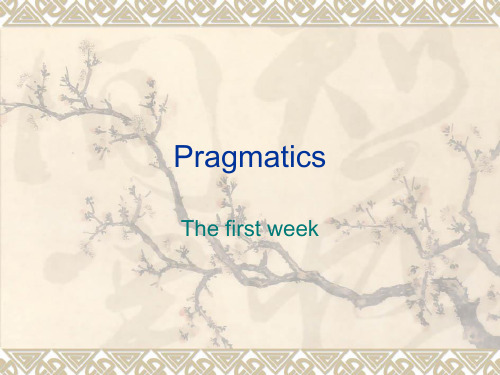
wh-trace
❖ eg. 1. Susan’s brother was killed t in the tsunami.
❖ 2. Who do you love t?
Overt NPs
❖ 1. Lexical anaphors ❖ The composers admire themselves. ❖ 2. Pronouns ❖ He is Italian enough to understand the culture, and
Eg. 1. Lance Armstrong won the centenar Tor de France. 2. Lance Armstrong the centerary Tour de France won.
Sentence-meaning
❖ Those aspectof meaning that are ascribeed to a sentence in the abstract, that is, a sentence independent of its realization in any concrete form.
❖ Eg. 1. Liszt adored chopin. ❖ 2. Chopin was adored by Liszt. ❖ 3. LISZT ADORED CHOPIN.
1.4 The advantage of studying language via pragmatics
❖ one can talk about people’s intended meanings, their assumptions, their purposes or goals, and the kinds of actions that they are performing when they speak.
语用学课件 Pragmatics 3
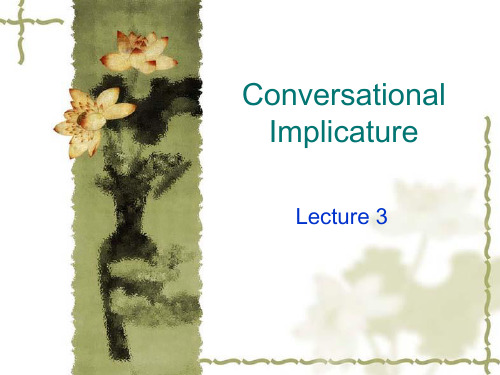
❖ “With some knowledge of a certain language, the speaker produces a standard grammatical sentence and this sentence, without any consideration of circumstantial factors, can be understood properly according to its conventional meaning.”
❖ A: Can you tell me the time? ❖ B: Well, the milkman has just come.
❖ It seems likely to simplify the structure and the content of semantic descriptions.
❖ She is poor and honest.
❖ She is poor but honest.
❖ (propositional content, implication)
❖ (context-free)
❖ Non-conversational vs. conversational
❖ A poorly described class which Grice thought as derivable from the possible “aesthetic, social, or moral” maxims which he indicated exist but did not argue for in his work
❖ The maxim of manner
❖ Be perspicuous, and specifically:
❖ A: Can you tell me the time? ❖ B: Well, the milkman has just come.
❖ It seems likely to simplify the structure and the content of semantic descriptions.
❖ She is poor and honest.
❖ She is poor but honest.
❖ (propositional content, implication)
❖ (context-free)
❖ Non-conversational vs. conversational
❖ A poorly described class which Grice thought as derivable from the possible “aesthetic, social, or moral” maxims which he indicated exist but did not argue for in his work
❖ The maxim of manner
❖ Be perspicuous, and specifically:
《语用学Pragmatics》课件 第六周

Triangular relation
• Utterer------linguistic forms------addressess
• Speak
language
interprete
• Presuppostion entailment
•
• Convey meaning • with one sentence •
b=Bill,c=Carol,L=like,M=mother, x and y are variables which may be translated as “someone”, “anyone” or “everyone”
• 1. M (a, b)
• 2. Ex (L (x,b)) • 3. L (b, c) ∧L (c, b) • 4. ~Ax (L (x, c)) • 5. L (a, b)∧~L (a, c) • 6. ~Ex (Ay (L (y,x)))
p q p ∧ q p∨ q p → q p≡ q
T TT
T
T
T
T FF
T
F
F
FT
F
T
T
F
FF
F
F
T
T
• 1.father=PARENT (x, y) ∧MALE (x) • 2.mother= PARENT (x, y) ∧~ MALE (x) • 3.son=CHILD (x, y) ∧ MALE (x) • 4.daughter=CHILD (x, y) ∧~ MALE (x) • 5.take=CAUSE (x, (HAVE (x, y))) • 6.give=CAUSE (x, (~ HAVE (x, y))) • 7. die=BECOME (x, (~ ALIVE (x))) • 8.kill=CAUSE (x, (BECOME (y, (~ ALIVE(y)))))
语言学课件Chapter 6 Pragmatics
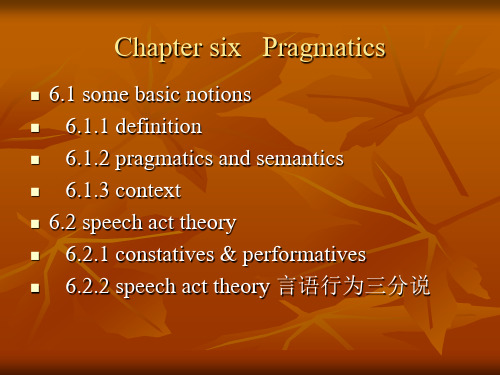
e.g. My bag is heavy.
Semantic analysis: BAG ( BEING HEAVY)
Pragmatic analysis: a statement; an indirect, polite request; a refusal
Utterance meaning is based on sentence meaning; it is the realization of the abstract meaning of a sentence in a real situation of communication, or simply in a context.
话语是句子意义与语境的结合,是句子意 义在特定语境中的具体化,体现了说话人 的意g is much richer than sentence meaning.
It varies with the context in which the sentence is used.
Context consists of the knowledge shared by the speaker and the hearer.
It includes the knowledge of the language they use, and the knowledge about the world, which can be subdivided into the general knowledge about the world and the specific knowledge about the situation in which communication is taking place.
1) The room is messy.
- 1、下载文档前请自行甄别文档内容的完整性,平台不提供额外的编辑、内容补充、找答案等附加服务。
- 2、"仅部分预览"的文档,不可在线预览部分如存在完整性等问题,可反馈申请退款(可完整预览的文档不适用该条件!)。
- 3、如文档侵犯您的权益,请联系客服反馈,我们会尽快为您处理(人工客服工作时间:9:00-18:30)。
If it is said at a party, it will be taken to mean that "John can drink a lot of wine", etc.
• Let's look back into our Chinese, the context is also very important. Behold these dialogues :
• 领导:“你这是什么意 思?”
• 小明:“没什么意思。意 思意思。”
• 领导:“你这就不够意思 了。”
• 小明:“小意思,小意 思。”
• 领导:“你这人真有意 思。”
• 小明:“其实也没有别的 意思。”
• 领导:“那我就不好意思 了。”
• 小明:“是我不好意思。”
• Moreover, every language in the world has DEICTICS, which identify objects, persons and events in terms of their relations to the speaker in space and time.
Pragmatics
Flower
I. Introduction
What is pragmatics?
Pramatics can be defined as the study of language in use and linguistic communication.
Why do we need pragmatics since we have grammatical analysis?
• After we have done grammatical analysis of a sentence, there is still some aspect of meaning uncovered by our analysis.
Example: The grammatical analysis of "He went to town yesterday" does not tell us who he is, which town or when yesterday. In other words, there are still things undetermined.
• Depending on the context, "he" can be anybody, any male. "Town" can refer to any place big enough to be called town. And "yesterday" can refer to any day in the past.
• “假的。”
• “真的么?”
• “真的”
• 问:小明的睫毛是真 的假的?
• 客服小姐:“小明你是要几等座?” • “你们一共有几等?” • “特等,一等,二等,等等,二等要多等一等。” • “我看下,等一等。” • “别等了,再等一等也没了。” • “那不等了就这个吧。” • 问:小明最终买了几等座?
• For example, there will be several possible interpretations to the utterance "John is like a fish" in isolation.
• But if it is said when John is swimming, it probably means "John swims well".
• As a result, the sentence must have performed many functions.
• From this brief discussion, we can see that the context of a situation in which a sentence is used contribute a lot to its meaning which cannot be accounted for in pure grammatical analysis.
• “小明,帮我擦下窗户好么?" • “我擦!!我不擦!!” • 问:小明擦不擦窗户?
• “小明,今晚上全 队去听讲座!你去 不去??”
• “我去!!我不去!!”
• 问:小明去不去 听讲座?
• “小明,今天上书 法课用不用带笔 啊?”
• “带毛笔啊!”
• 问:小明的意思 是带不带笔?
• “小明,你的睫毛好漂 亮,真的假的?”
• Much of the meaning of deictic terms depends on the specific context of situation in which they are used.
• In English deictics may be grouped into 3 categories.
• 1.person deictics: used to identify participants in the discourse. "I" and "We" are to refer to the speaker and "you" the hearer. The third person pronouns are used to refer to people other than participants.
II. Context &context is particularly significant in pragmatics because it contributes a lot to the meaning of an utterance.
• In a sense pragmatics studies how contextual features determine or influence the interpretation of utterances.
• Let's look back into our Chinese, the context is also very important. Behold these dialogues :
• 领导:“你这是什么意 思?”
• 小明:“没什么意思。意 思意思。”
• 领导:“你这就不够意思 了。”
• 小明:“小意思,小意 思。”
• 领导:“你这人真有意 思。”
• 小明:“其实也没有别的 意思。”
• 领导:“那我就不好意思 了。”
• 小明:“是我不好意思。”
• Moreover, every language in the world has DEICTICS, which identify objects, persons and events in terms of their relations to the speaker in space and time.
Pragmatics
Flower
I. Introduction
What is pragmatics?
Pramatics can be defined as the study of language in use and linguistic communication.
Why do we need pragmatics since we have grammatical analysis?
• After we have done grammatical analysis of a sentence, there is still some aspect of meaning uncovered by our analysis.
Example: The grammatical analysis of "He went to town yesterday" does not tell us who he is, which town or when yesterday. In other words, there are still things undetermined.
• Depending on the context, "he" can be anybody, any male. "Town" can refer to any place big enough to be called town. And "yesterday" can refer to any day in the past.
• “假的。”
• “真的么?”
• “真的”
• 问:小明的睫毛是真 的假的?
• 客服小姐:“小明你是要几等座?” • “你们一共有几等?” • “特等,一等,二等,等等,二等要多等一等。” • “我看下,等一等。” • “别等了,再等一等也没了。” • “那不等了就这个吧。” • 问:小明最终买了几等座?
• For example, there will be several possible interpretations to the utterance "John is like a fish" in isolation.
• But if it is said when John is swimming, it probably means "John swims well".
• As a result, the sentence must have performed many functions.
• From this brief discussion, we can see that the context of a situation in which a sentence is used contribute a lot to its meaning which cannot be accounted for in pure grammatical analysis.
• “小明,帮我擦下窗户好么?" • “我擦!!我不擦!!” • 问:小明擦不擦窗户?
• “小明,今晚上全 队去听讲座!你去 不去??”
• “我去!!我不去!!”
• 问:小明去不去 听讲座?
• “小明,今天上书 法课用不用带笔 啊?”
• “带毛笔啊!”
• 问:小明的意思 是带不带笔?
• “小明,你的睫毛好漂 亮,真的假的?”
• Much of the meaning of deictic terms depends on the specific context of situation in which they are used.
• In English deictics may be grouped into 3 categories.
• 1.person deictics: used to identify participants in the discourse. "I" and "We" are to refer to the speaker and "you" the hearer. The third person pronouns are used to refer to people other than participants.
II. Context &context is particularly significant in pragmatics because it contributes a lot to the meaning of an utterance.
• In a sense pragmatics studies how contextual features determine or influence the interpretation of utterances.
